15 start with U start with U

Once described by Trygve Lie as the "most impossible job on earth," the position of UN Secretary-General is as frustratingly constrained as it is prestigious. The Secretary-General's ability to influence global affairs often depends on how the international community regards his moral authority. In relation to such moral authority, past office-holders have drawn on their own ethics and religious backgrounds—as diverse as Lutheranism, Catholicism, Buddhism, and Coptic Christianity—to guide the role that they played in addressing the UN's goals in the international arena, such as the maintenance of international peace and security and the promotion of human rights. In The UN Secretary-General and Moral Authority, contributors provide case studies of all seven former secretaries-general, establishing a much-needed comparative survey of each office-holder's personal religious and moral values. From Trygve Lie's forbearance during the UN's turbulent formative years to the Nobel committee's awarding Kofi Annan and the United Nations the prize for peace in 2001, the case studies all follow the same format, first detailing the environmental and experiential factors that forged these men's ethical frameworks, then analyzing how their "inner code" engaged with the duties of office and the global events particular to their terms.
Balanced and unbiased in its approach, this study provides valuable insight into how religious and moral leadership functions in the realm of international relations, and how the promotion of ethical values works to diffuse international tensions and improve the quality of human life around the world.

Cultural factions are an intrinsic part of the fabric of American politics. But does this mean that there is no room for compromise when groups hold radically different viewpoints on major issues? Not necessarily. For example, in a June 2003 Time/CNN poll, 49% of respondents identified themselves as pro-choice and 46% identified as pro-life. But in the same poll, 81% indicated that abortion should be "always legal" or "sometimes legal," suggesting that "pro-life" and "pro-choice" are not discrete positions but allow room for compromise.
How do legislators legislate policy conflicts that are defined in explicitly cultural terms such as abortion, gay marriage, and school prayer? American political institutions are frequently challenged by the significant conflict between those who embrace religious traditionalism and those who embrace progressive cultural norms. Uncompromising Positions: God, Sex, and the U.S. House of Representatives investigates the politics of that conflict as it is manifested in the proceedings of the U.S. House of Representatives. Oldmixon traces the development of these two distinct cultures in contemporary American politics and discusses the decision-making and leadership tactics used by legislators to respond to this division of values. She argues that cultural conflict produces an absolutist politics that draws on religious values not amenable to compromise politics. One possible strategy to address the problem is to build bipartisan coalitions. Yet, interviews with House staffers and House members, as well as roll calls, all demonstrate that ideologically driven politicians sacrifice compromise and stability to achieve short-term political gain. Noting polls that show Americans tend to support compromise positions, Oldmixon calls on House members to put aside short-term political gain, take their direction from the example of the American public, and focus on finding viable solutions to public policy—not zealous ideology.

For some time, the United States has been engaged in a national debate over affirmative action policy. A policy that began with the idea of creating a level playing field for minorities has sparked controversy in the workplace, in higher education, and elsewhere. After forty years, the debate still continues and the issues are as complex as ever. While most Americans are familiar with the term, they may not fully understand what affirmative action is and why it has become such a divisive issue.
With this concise and up-to-date introduction, J. Edward Kellough brings together historical, philosophical, and legal analyses to fully inform participants and observers of this debate. Aiming to promote a more thorough knowledge of the issues involved, this book covers the history, legal status, controversies, and impact of affirmative action in both the private and public sectors—and in education as well as employment.
In addition, Kellough shows how the development and implementation of affirmative action policies have been significantly influenced by the nature and operation of our political institutions. Highlighting key landmarks in legislation and court decisions, he explains such concepts as "disparate impact," "diversity management," "strict scrutiny," and "representative bureaucracy." Understanding Affirmative Action probes the rationale for affirmative action, the different arguments against it, and the known impact it has had. Kellough concludes with a consideration of whether or not affirmative action will remain a useful tool for combating discrimination in the years to come.
Not just for students in public administration and public policy, this handy volume will be a valuable resource for public administrators, human resource managers, and ordinary citizens looking for a balanced treatment of a controversial policy.

Cyber weapons and the possibility of cyber conflict—including interference in foreign political campaigns, industrial sabotage, attacks on infrastructure, and combined military campaigns—require policymakers, scholars, and citizens to rethink twenty-first-century warfare. Yet because cyber capabilities are so new and continually developing, there is little agreement about how they will be deployed, how effective they can be, and how they can be managed.
Written by leading scholars, the fourteen case studies in this volume will help policymakers, scholars, and students make sense of contemporary cyber conflict through historical analogies to past military-technological problems. The chapters are divided into three groups. The first—What Are Cyber Weapons Like?—examines the characteristics of cyber capabilities and how their use for intelligence gathering, signaling, and precision striking compares with earlier technologies for such missions. The second section—What Might Cyber Wars Be Like?—explores how lessons from several wars since the early nineteenth century, including the World Wars, could apply—or not—to cyber conflict in the twenty-first century. The final section—What Is Preventing and/or Managing Cyber Conflict Like?—offers lessons from past cases of managing threatening actors and technologies.

The Welfare Reform Act of 1996 drastically changed the delivery of social services in the United States for the first time in sixty years. More than a decade later, according to Catholic social ethicist Thomas Massaro, a disturbing gap exists between the laws we have enacted as a nation and the moral concerns we profess as a people.
Massaro contends that ethicists too often focus on strictly theoretical concerns rather than engaging concrete social and political issues, while public policy experts are uncomfortable drawing ethical judgments about legislation. United States Welfare Policy takes a fresh approach to the topic by using Catholic social teaching as a lens through which to view contemporary American welfare policies, citing the tradition's emphasis on serving the needy—including a preferential option for the poor—and the common good.
Massaro maintains that the most important outcome of welfare policy is not the cost-effectiveness of programs, but the well-being of individual families. The concluding analysis of this thoughtful study applies Catholic ethical concerns to specific aspects of welfare reform, including the funding mechanisms for the Temporary Assistance to Needy Families (TANF) program, work participation requirements affecting the bond between mothers and children, eligibility rules, the intrusion of family caps into reproductive decisions, and the imposition of disproportionate burdens upon particular demographic groups.
Massaro offers possible alternatives in each case and, as the fight over reauthorization of the welfare act continues, he calls on Catholic churches and clergy and laity to take action and advocate publicly for a more ethical approach to welfare reform.

Johannes Morsink argues that the 1948 UN Universal Declaration of Human Rights and the human rights movement today are direct descendants of revulsion to the Holocaust and the desire to never let it happen again.
Much recent scholarship about human rights has severed this link between the Holocaust, the Universal Declaration, and contemporary human rights activism in favor of seeing the 1970s as the era of genesis. Morsink forcefully presents his case that the Universal Declaration was indeed a meaningful though underappreciated document for the human rights movement and that the declaration and its significance cannot be divorced from the Holocaust. He reexamines this linkage through the working papers of the commission that drafted the declaration as well as other primary sources.
This work seeks to reset scholarly understandings of the Universal Declaration of Human Rights and the foundations of the contemporary human rights movement.

This book explores an important side of public employment that most Americans never get the opportunity to see—high-level career executives who make positive contributions to our quality of life. Norma M. Riccucci profiles six "unsung heroes," the people behind the scenes of some of the most successful programs in American government, and identifies the tools, skills, and strategies that make them effective leaders.
Through in-depth interviews and provocative story-telling, Riccucci demonstrates that while these executive-level bureaucrats—or "execucrats"—may have an overall negative public image, they create, develop, execute, and enforce a number of programs and public policies that change our country for the better. She highlights six of these modern execucrats who best exemplify the creativity, determination, and leadership found in such officials:
—William Black, Senior Deputy Chief Counsel, Office of Thrift Supervision, who attacked the rampant corruption and mismanagement that created the savings and loan crisis;
—Eileen Claussen, Director, Atmospheric and Indoor Air Programs, U.S. Environmental Protection Agency, who negotiated as intensely within her own government as with other countries to create an international plan to protect the earth's ozone layer;
—Ambassador Edward Perkins, U.S. State Department, the first African-American Ambassador to South Africa and the first American ambassador to meet with black South African leaders as part of his persistent efforts to end apartheid in that country;
—Stephen Marica, Assistant Inspector General, Small Business Administration, who investigated the Wedtech scandal, which bilked millions of dollars in fraudulent defense contracts from American taxpayers;
—Dr. Vince Hutchins, Director, Division of Maternal and Child Health, U.S. Department of Health and Human Services, who spearheaded the team that developed "Healthy Mothers, Healthy Babies Coalition," a public-private partnership that improved, and even saved, the lives of thousands of newborn babies; and
—Dr. Helene Gayle, Division Chief, HIV-AIDS Division, U.S. Centers for Disease Control, who is actively battling the AIDS virus through education and prevention programs around the world.
Riccucci not only relates the intriguing tales of these six dedicated officials who overcame the challenges before them, but she also analyzes the specific factors—from knowledge of the system to honesty, integrity, and humor—that are needed to become a dynamic government executive. Of interest to those both inside and outside government circles, Unsung Heroes gives captivating insights into effective executive leadership.
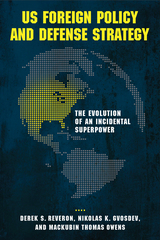
Safe from the battlefields of Europe and Asia, the United States led the post–World War II global economic recovery through international assistance and foreign direct investment. With an ardent decolonization agenda and a postwar legitimacy, the United States attempted to construct a world characterized by cooperation. When American optimism clashed with Soviet expansionism, the United States started on a path to global hegemony.
In US Foreign Policy and Defense Strategy, the authors analyze the strategic underpinnings of hegemony, assess the national security establishment that sustains dominance, consider the impact on civil-military relations, and explore the intertwining relationships between foreign policy, defense strategy, and commercial activities. Eschewing conventional analyses, the volume not only identifies drivers and continuities in foreign policy, but it also examines how the legacy of the last sixty-five years will influence future national security policy that will be characterized by US leadership in an increasingly competitive world.
From civil-military relations to finance, and from competing visions of how America should make war to its philosophy of securing peace through reconstruction and reconciliation, US Foreign Policy and Defense Strategy offers unique insights into the links between military and commercial power as it charts the rise of a historical rarity: the incidental superpower. This accessibly written book is suitable for students and general readers as well as scholars.

The U.S. Supreme Court—at least until Bush v. Gore—had seemed to float along in an apolitical haze in the mind of the electorate. It was the executive branch and the legislative branch that mucked about in politics getting dirty, the judicial branch kept its robes—and nose—clean. The U.S. Supreme Court and the Electoral Process makes it abundantly clear however that before, during, and after the judicial decision that made George W. Bush the President of the United States, everything was, is, and will likely be, politics-including the decisions handed down by the highest court in the land.
This revised and updated edition takes into account not only the recent famous (or infamous, depending on the reader's point of view) judicial decision on the Presidency, but a myriad of others as well in which the U.S. Supreme Court has considered the constitutionality of a wide range of issues involving voting and elections, representation, and political participation. Practitioners and academics in both law and political science examine a number of court actions that directly affect how we choose those who govern us, and how those decisions have affected our electoral politics, constitutional doctrine, and the fundamental concepts of democracy, including: racial redistricting, term limits, political patronage, campaign finance regulations, third-party ballot access, and state ballot initiatives limiting civil liberties.
Of the first edition, CHOICE said, The U.S. Supreme Court and the Electoral Process "plumbs the Supreme Court's constitutive apolitical role as 'primary shaper of the electoral system' and reveals the pervasive involvement of the Court in the political process."

When humans learn languages, are they also learning how to create shared meaning? In The Usage-based Study of Language Learning and Multilingualism, a cadre of international experts say yes and offer cutting-edge research in usage-based linguistics to explore how language acquisition, in particular multilingual language acquisition, works.
Each chapter presents an original study that supports the view that language learning is initiated through local and meaningful communication with others. Over an accumulated history of such usage, people gradually create more abstract, interactive schematic representations, or a mental grammar. This process of acquiring language is the same for infants and adults and across varied contexts, such as the family, the classroom, the laboratory, a hospital, or a public encounter. Employing diverse methodologies to study this process, the contributors here work with target languages, including Cantonese, English, French, French Sign Language, German, Hebrew, Malay, Mandarin, Spanish, and Swedish, and offer a much-needed exploration of this growing area of linguistic research.
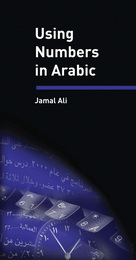
Using Numbers in Arabic is an invaluable reference for the intermediate to advanced learner of Arabic. The proper use of numbers can often be perplexing for students of the Arabic language. While most Arabic grammars and textbooks include a chapter or discussion on the topic, that coverage is inadequate for serious students, scholars, and researchers.
This guide shows the reader, using clear explanations and examples, exactly how to use cardinal and ordinal numbers in Arabic, from one to the billions and beyond. Each entry features a brief description in English followed by examples in Arabic from actual written and recorded texts; each example is also accompanied by an English translation. All information is based on real-world practice, with helpful citations from literature and media to illustrate each principle. In a second section, the author covers useful number-related topics, such as dates, times, fractions, decimals, and percentages, as well as basic arithmetic functions. While focusing on Modern Standard Arabic, the volume also covers Classical Arabic and describes and illustrates differences between classical and modern practice. The volume’s glossary, bibliography, and index will also be useful to students.
Using Numbers in Arabic is a handy addition to the reference shelf of every serious student of the Arabic language, and it will be welcomed by native speakers with fluency in English interested in a reference on how to render numbers correctly.
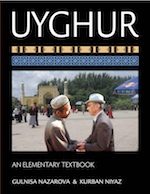
The Uyghurs are one of the oldest Turkic-speaking peoples of Central Asia. Their language is closely related to Uzbek, with which it shares a common ancestor. Modern Uyghur is spoken by about 11 million people in Xinjiang and 2 million people in Central Asia and elsewhere. This textbook offers beginning students a thematically organized and integrative approach to the Uyghur language that emphasizes communicative activities, step-by-step development of linguistic skills, and elements of Uyghur culture. A multimedia DVD includes audio that helps develop listening and speaking skills and videos filmed in different regions of Xinjiang, China.
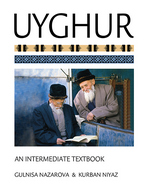
Uyghur: An Intermediate Textbook offers students, professionals, and travelers alike the preeminent tool for expanding their knowledge of the Uyghur language and culture. Combining innovative language learning methodology with authentic audio and video materials, this textbook develops the four primary language skills—speaking, listening, reading, and writing—by integrating them into a clear, balanced whole.
Uyghur: An Intermediate Textbook prepares learners to perform at level 1+/2 or 2+ on the ILR scale and at the Intermediate High to Advanced Mid/High levels on the ACTFL scale.
Features include:
* A multimedia CD that contains videos filmed on location as well as both authentic and scripted audio segments, all highlighting key elements of Uyghur culture
* Authentic original and modified reading passages ranging from short stories to news articles to menus
* Abundant cultural notes to reinforce reading, grammar, and vocabulary skills
* Easy-to-understand examples and exercises on points of Uyghur grammar
* Chapter themes that facilitate immersion in daily Uyghur life and culture
Designed for both classroom and on-the-ground learners, and developed in accordance with the latest ideas in performance-based principles and methodology, Uyghur: An Intermediate Textbook guides readers on a journey to the heart of a fascinating culture.
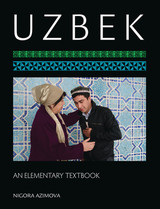
Designed to cover beginning college levels of language instruction, Uzbek: An Elementary Textbook provides learners and instructors with a wide selection of materials and task-oriented activities to facilitate the development of language learning. It offers a thematically organized and integrative approach to the Uzbek language and its culture, including a functional approach to grammar, an emphasis on integrated skills development, and the use of authentic materials such as videos filmed in various regions of Uzbekistan.
This volume includes -authentic audio and video materials, available for free on GUPTextbooks.com-an extensive glossary-color illustrations and photographs throughout Topics CoveredThe Uzbek alphabet, greetings and introductions, commands and requests, daily routines, etiquette, weather, family, money, food, clothing, travel, leisure, and medical matters.
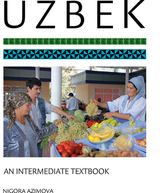
Using a wide selection of materials and task-oriented activities drawn from realistic situations and contexts, Uzbek: An Intermediate Textbook, is designed to help adult professional and higher education learners deepen their understanding of the Uzbek language, culture, and its people. Learners will develop listening, reading, speaking, and writing skills, with special attention to grammatical accuracy. With a variety of texts, audio clips, videos, and activities, this textbook will encourage learners to explore Uzbek culture and to compare and contrast it with their own.
Uzbek: An Intermediate Textbook prepares learners to perform at level 1+ or 2 on the ILR scale and at the Intermediate High or Advanced Low level on the ACTFL scale.
Features of Uzbek: An Intermediate Textbook:-Topics covered include work, study, personal interests, and travel.-Authentic audio and video materials to accompany the text, available for free on GUPTextbooks.com-The book uses the Cyrillic alphabet—the alphabet used in current government reports and the mass media as well as in archival material from the Soviet era.-A useful appendix compares the Cyrillic alphabet with the Latin alphabet.-Uzbek-English and English-Uzbek glossaries facilitate vocabulary acquisition.
READERS
Browse our collection.
PUBLISHERS
See BiblioVault's publisher services.
STUDENT SERVICES
Files for college accessibility offices.
UChicago Accessibility Resources
home | accessibility | search | about | contact us
BiblioVault ® 2001 - 2024
The University of Chicago Press









